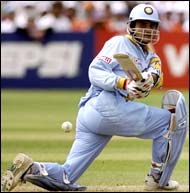 Home > Cricket > Diary archives
Home > Cricket > Diary archivesOctober 31, 2001
'Why should a game be reserved for whites alone?'
Faisal ShariffThe 2003 World Cup, he believes, is an opportunity for all people of South Africa to come together, irrespective of colour and creed.
Dr Aaron (Ali) Bacher, former managing director of the United Cricket Board of South Africa, now fronts that country's organizing committee for the 2003 World Cup, which he believes, will do for his country what the 2000 Olympics in Sydney did for Australia.
Bacher is seen as one of the guiding spirits of South African cricket. Though soundly criticised for organising rebel tours by various teams to South Africa during that country's apartheid-inspired isolation from international cricket, Bacher has argued that since the ban was indefinite, some means had to be found to sustain interest in the game.
 "At the time, we naively imagined that the coloured population wouldn't
mind the tours. It was only when England captain Mike Gatting led a rebel team
to South Africa that we witnessed the anger of the coloureds, and realised
the depth of their feeling. Had we known this earlier, we perhaps would not
have organised such tours," Bacher admits.
"At the time, we naively imagined that the coloured population wouldn't
mind the tours. It was only when England captain Mike Gatting led a rebel team
to South Africa that we witnessed the anger of the coloureds, and realised
the depth of their feeling. Had we known this earlier, we perhaps would not
have organised such tours," Bacher admits.
"The development programme is easily the key to our successful integration of the coloured people into South African cricket," he points out.
"The will to reach the grass-root level and unearth talent from the black townships is a significant reason. There is political stability in the country, we have wonderful leaders like Nelson Mandela, who have supported the process of reconciliation, who showed the way during the phase of forgiving and moving on, leaving behind thoughts of revenge and hatred."
Explaining the three basic components in the argument favouring inclusion of coloured people in the team, Bacher believes that it is morally correct -- "why should a game be reserved for whites alone?"
Secondly, he says, it makes a lot of business sense, since it widens the audience base as well, and that makes South African cricket commercially stronger.
And thirdly, he's of the view that it makes cricketing sense," as from the 1960s, SA has been picking teams from a base of a few million whites".
"Now we have a nation of 40 million to choose from, and that should add to our playing strength," he explains.
Bacher has been in the vanguard of South Africa's climb to the top of world cricket with the single objective of representation of all people of South Africa, and that includes the coloured population.
"It's not just me," he replies in a moment of modesty. "There is a great team here that makes it all possible, and they include some committed administrators, development officers. The South African board is collectively committed to taking cricket to all parts of the country, and making our side the best in the world.
"Speaking personally, my driving force is love for, passion for the game. South African cricket has been good to me, and whatever I can do to contribute something to the game here, I will do that."
With terrorism now becoming a very real threat, Bacher has promised a World Cup which is trouble-free. "In place is a high-powered directorate to oversee the logistical aspects of safety and security with a budget for security of eight million rand, which would be revised upwards if the need arises," he informs.
Bacher holds the Indian team in high esteem.
 "The Indians are a very attractive team, with world-class players. The
real potential of the Indians will be seen when they take on South Africa in
the Test series, beginning in November. [Rahul] Dravid and [Sourav] Ganguly are
top-class players; Sachin [Tendulkar] is one of the greatest players of
all time. Srinath, Kumble and Harbhajan Singh could walk into any team in
world cricket. With so much talent, South Africa face very tough competition."
"The Indians are a very attractive team, with world-class players. The
real potential of the Indians will be seen when they take on South Africa in
the Test series, beginning in November. [Rahul] Dravid and [Sourav] Ganguly are
top-class players; Sachin [Tendulkar] is one of the greatest players of
all time. Srinath, Kumble and Harbhajan Singh could walk into any team in
world cricket. With so much talent, South Africa face very tough competition."
Bacher has also been in the forefront to globalise cricket and has repeatedly called for inclusion of more countries in the World Cup competition.
Despite a surprise win over India in the recently-concluded one-day tourney, Kenya was beaten and seemed out of its depth with the other cricket-playing nations. And yet Bacher repeats the globalisation mantra calling for nations like Kenya to be given more chances to play. He argues that since they were granted international status a couple of years back, they haven't really got too many opportunities to play at the highest level.
"We knew, when we included them in the triangular, that they would get beaten -- but they will return richer from the experience. Playing in this tournament will help make them a far more competitive outfit in the World Cup. As for including more teams for the WC 2007, the 2003 edition will determine that. The question of how teams from the Netherlands; Canada and Namibia fare will determine whether there is a case for the inclusion of more teams."
The former captain of South Africa believes in striking a balance between using the technological advances in sport and the traditional role of umpires.
"You have to be progressive without becoming too radical, and you must advance without losing the essential ethos, the values, of the game," he says.
During the 1999 World Cup, South Africa's then captain, Hansie Cronje, wore a earpiece and listened to suggestions from his coach. Bacher believed that it was a wrong decision because he reckons that captaincy in cricket is an important component of the game; it is not like soccer for instance where the coach controls the game from the sidelines.
"In Test cricket especially, brilliant captaincy is one of the essential elements of the game; captaincy wins games; a good captain lifts a team and can, through strategic brilliance, make an impact on the outcome. Mark Taylor of Australia, and Mike Brearley of England were great captains.
"You can't take that aspect away from the game by having a coach whisper instructions from the sidelines; you can't afford to lose that aspect of the game."
South Africa has been through a particularly tough phase with the match-fixing imbroglio and the banning of Hansie Cronje. But Bacher, the tough statesman that he is, commends his people, saying they are resilient and have managed to see that period through.
"We have decided to look ahead instead of behind. In skipper Shaun Pollock, we have found a great leader of men," he declares.
The Rediff Email Diary -- the complete archives
![]()
![]()
Email : Prem Panicker
©1996 to 2001 rediff.com India Limited. All Rights Reserved.